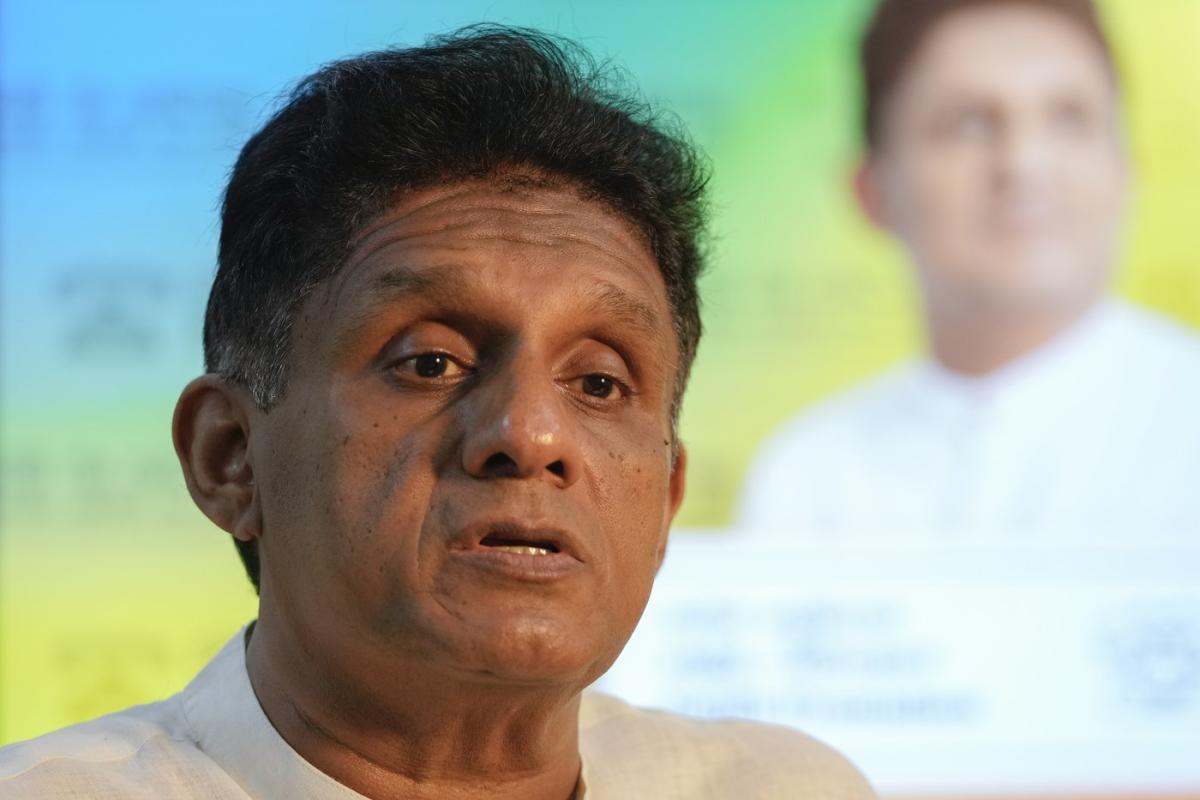COLOMBO, Sri Lanka (AP) — Sri Lanka’s opposition leader said Thursday that if he wins the country’s presidential race, he will renegotiate the International Monetary Fund economic reforms package to ensure rich residents pay more taxes and poor ones see their conditions improve.
Sajith Premadasa, the opposition leader in Parliament told The Associated Press in an interview that his party has already started discussions with the IMF to find ways to ease people’s tax burden. The reforms were introduced after Sri Lanka defaulted on its foreign debt creating the worst economic crisis in its history.
“We will be embarking on the third path, the middle path, the path is where wealth is created, the country grows and the wealth is equitably distributed,” Premadasa said.
He said there needs to be “fundamental changes” to the current agreement between the IMF and Sri Lanka’s government, done in a more “humanistic manner” to ensure that the burden on the people is lessened.
“And if there are burdens that have to be imposed, the super-rich and the rich have to disproportionately take a bigger share of the burden rather than the working men and women of Sri Lanka.”
Sri Lanka is in the middle of reforms and a debt restructuring program under an IMF agreement whereby taxes have been increased to boost state revenue. After the island nation defaulted on its foreign debt in 2022, borrowing was reduced and the printing of new currency notes was stopped by law.
The opposition parties say many of the wealthy and those who have connections with authorities don’t pay their taxes, and the burden is borne by the middle and lower classes through income taxes and value-added tax on goods and services.
The presidential election on Sept. 21 is seen as a referendum on the reforms initiated by President Ranil Wickremesinghe. They have improved key economic figures, but their effects have yet to reach many ordinary people.
Premadasa criticized Wickremesinghe’s economic policies, saying that he is trying to find solutions through contraction. Premadasa said his policy is to “grow out of the problem” through an export-oriented, knowledge-based economy.
Premadasa, 57, is the son of a former president late Ranasinghe Premadasa, who was assassinated by an ethnic Tamil separatist suicide bomber in 1993.
He also ran in the 2019 presidential election and lost to Gotabaya Rajapaksa, who was forced to flee after two years amid angry protests against the country’s economic meltdown.
Unsustainable debt, the COVID-19 pandemic, and the government’s spending of scarce foreign reserves to prop up the country’s currency, the rupee, led to a severe shortage of essentials such as fuel, medicine, cooking gas and food in 2022. It sparked riots, forcing Rajapaksa to flee the country and later resign. Sri Lanka’s parliament elected Wickremesinghe as president to cover Rajapaksa’s remaining time.
Wickremesinghe is also running in the election and is seeking approval for his economic agenda, promising rapid growth with an ambitious target of making Sri Lanka a developed nation by the centenary of its independence in 2048.
Inflation dropped to 0.5% in August from 70% two years ago under Wickremesinghe’s administration. Interest rates have also come down, the rupee has rebounded, and foreign currency reserves have increased. Creditor countries such as India, Japan and France have agreed to defer debt repayments until 2028, giving the island nation space to rebuild its economy.
But professionals complain of high taxes, and all have been affected by high living costs.
Premadasa is one of the three leading candidates, from a total of 38, and is supported by many ethnic and religious minority groups.
Premadasa said he would prosecute those in the Rajapaksa administration who ordered cremating the dead bodies of Muslim COVID-19 victims — part of a government mandate at the height of the pandemic to avoid contamination, but one that ignored religious sentiments — and pay compensation to their families. Premadasa called it a “racist policy.”
He also said that he would allow maximum devolution of power to the ethnic Tamil majority in the northern and eastern provinces, a long-standing demand from the community. He also promised to call an international donor conference to help rebuild areas affected by a 26-year separatist civil war in those provinces.
The war killed at least 100,000 people.
Premadasa also said he would bring closure to the issue of forcible disappearances and those who went missing in action.
Krishan Francis, The Associated Press

